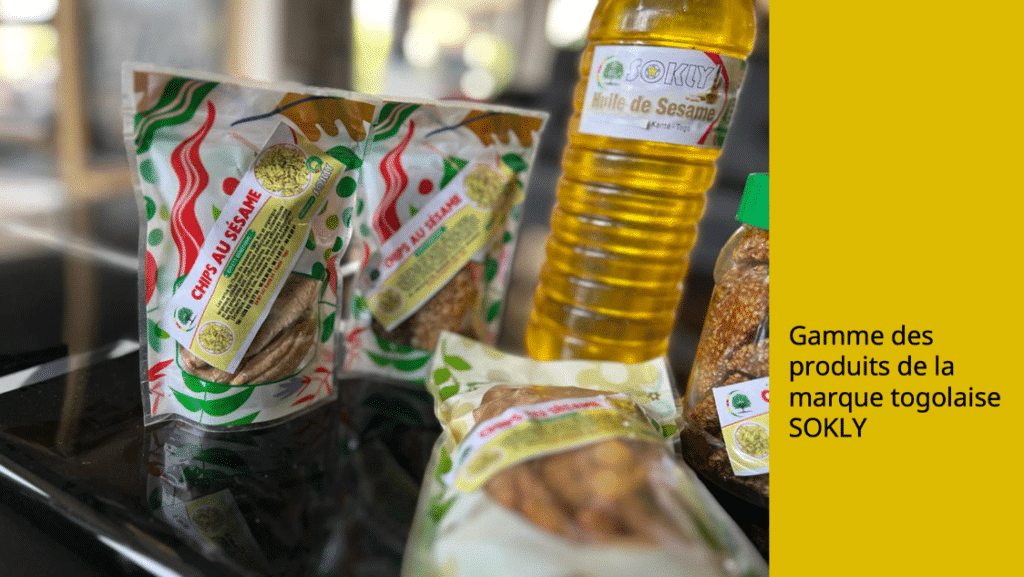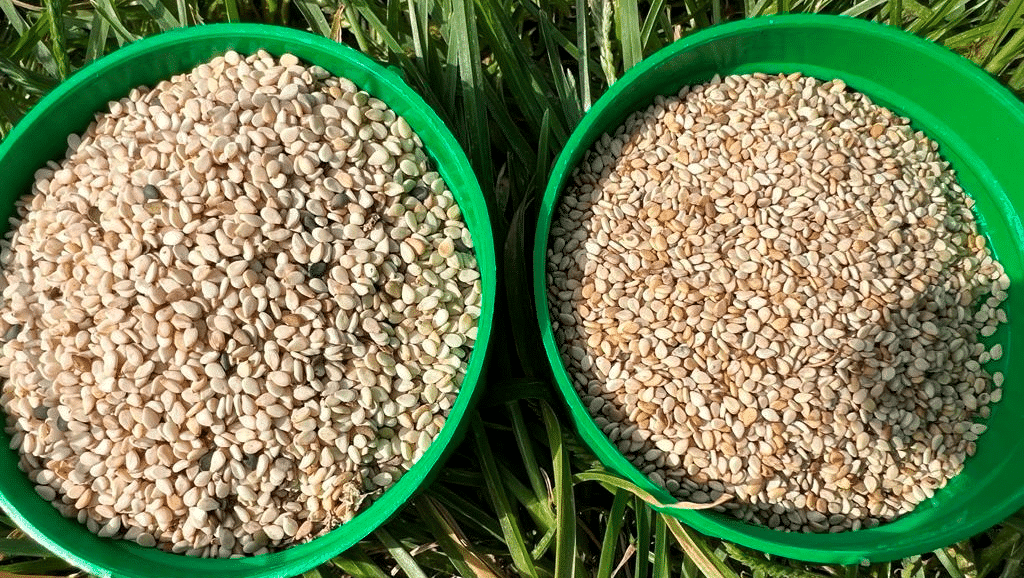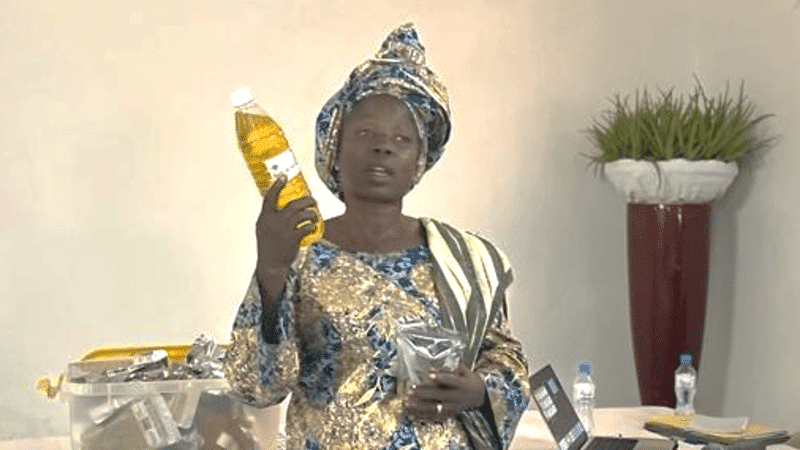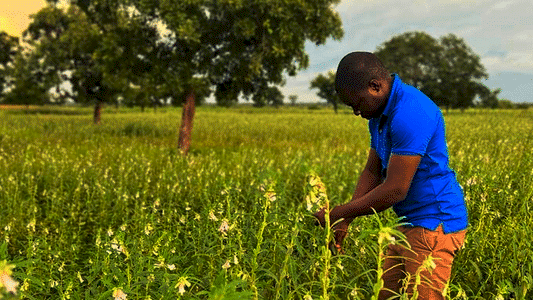Mrs. Akossia Kalibou is a skilled processor and craftswoman hailing from Kanté in northern Togo. In 2016, Akossia stumbled upon an exciting business opportunity while attending a fair in the capital, Lomé. At the fair, she discovered sesame oil and was instantly fascinated by its potential. She purchased half a liter of oil and inquired about the manufacturing process from the exhibitor.
Once back home, Mrs. Kalibou enlisted the help of a local tool maker to create a prototype of an extraction machine. And thus, the SOKLY brand was born. Today, Mrs. Kalibou produces an array of products including sesame oil, cookies, chips, and energy bars made from sesame seeds. She distributes her products to customers in Lomé and exports them to Gabon. Mrs. Kalibou’s entrepreneurial spirit and dedication have helped her turn her business into a success story.
While Togo has the necessary human and natural resources to develop its sesame processing sector, there are significant gender gaps that need to be addressed. Encouraging and enabling more women like Mrs. Kalibou to participate in the sector is a necessary condition for the growth of the sector and to make it more competitive.
The ICR Facility is currently working with Togo’s Ministry of Investment Promotion and Ministry Agriculture of Togo to improve women’s participation in the sesame value chain. As a part of this intervention, more than fifty interviews were conducted from September 2022 to January 2023 to evaluate the business environment in the sector, with a particular focus on the Savanes and Kara regions. The results will provide key data on the sector which will help Togo’s policymakers target their action to support the participation of women in the sesame sector.
Women’s Potential Remains Untapped
Preliminary findings from the assessment suggest that women are currently undervalued in the agricultural sector but have the potential to play a more significant role in its development. Although women are involved in all aspects of the value chain as producers, aggregators, traders, and processors, only 5% of the businesses surveyed were women-led, managed, or represented.
In the sesame value chain, women are often relegated to less visible roles, yet they remain indispensable to the sector’s success. Their involvement in activities such as drying, packaging, processing, and sales underscores their essential contributions to the sector. When examining the various links in the sesame value chain, our field research shows that women are more represented in areas beyond production. These include drying, packaging (bagging), processing into finished products, and sales, including exports.
Greater recognition and inclusion of women in the sesame sector are crucial for driving success and ensuring sustainability in the sector. International experience has shown that when women are given better access to resources and training, they can significantly improve productivity and overall performance in agriculture. In fact, studies have found that when women are given the same resources and opportunities as men, they can increase their yields by up to 30%, which can result in a significant boost in household income and food security.
The need to tackle land ownership barriers
Women’s limited access to land ownership remains a significant barrier to their full participation in the sector. Togo has taken a major stride towards gender equality with the introduction of the new land code in 2018. This landmark legislation ensures that women have equal access to land.
The new land code was designed to eliminate any ambiguity in customary and modern laws that had previously discriminated against women. However, gaps in implementation persist, particularly in rural areas. Women continue to face difficulties in purchasing land, as many landowners are unwilling to sell to them. Women also often encounter challenges to inheriting land, as they are frequently discriminated compared to male relatives.
Addressing these issues require both the involvement of national and local authorities to improve the enforcement of the new regulatory framework, as well as campaigns to shift cultural attitudes towards gender equality in land ownership.
Enhancing Women's Role in the Sesame Value Chain: Insights from Women in the Sector
Women in the sesame sector interviewed have identified two critical actions to increase their participation and productivity.
- Improving access to resources such as adapted equipment, tools, and financing, particularly for female processors, is crucial to enhancing their role in the value chain and overcoming significant barriers to finance, such as discriminatory lending practices and lack of collateral.
- Training young girls in agricultural high schools in the fields of sesame processing, entrepreneurship, and management is vital for building a new generation of skilled workers and entrepreneurs in the sector.
The ICR facility supports partners in ACP countries to enable an effective and conducive business environment that fosters women’s economic empowerment. Challenges faced by women in agriculture are multi-dimensional. They range from lack of representation in leadership roles to land property issues, discriminatory practices, and lack of access to finance, among others. ICR’s on-demand technical assistance interventions are designed to support our partners efforts to tackle those challenges from diagnostic to implementation of the necessary changes needed. The case of Togo’s sesame sector is an example of the challenges to overcome and how equal participation of men and women in the value chain is not only a matter of gender equality. It is also a necessary step towards sustainable growth in the sector.



This publication is part of an intervention supported by the Investment Climate Reform (ICR) Facility. The ICR Facility is co-funded by the European Union (EU), the Organisation of African, Caribbean and Pacific States (OACPS) under the 11th European Development Fund (EDF), the German Federal Ministry for Economic Cooperation and Development (BMZ) and the British Council. The ICR Facility is implemented by GIZ, the British Council, Expertise France, and SNV. The contents of this publication are the sole responsibility of the author and do not necessarily reflect the views of the donors or the implementing partners.
Bibliography:
FAO. 2018. National gender profile of the agriculture and rural development sectors. s.l. : FAO, 2018.
UNDP. 2022. UNDP Contributions to the Implementation of the GENDER EQUITY AND EQUALITY POLICY in the Framework of the Togo 2025 Government Roadmap. s.l.: UNDP, 2022. : UNDP, 2022.
Land & Development. 2020. Togo: Facilitating Women’s Access to Land. www.foncier-developpement.fr. [Online] October 2020. WWW.FONCIER-DEVELOPPEMENT.FR/ACTUALITE/TOGO-FACILITER-LACCES-DES-FEMMES-AU-FONCIER/.
Government of the Togolese Republic. 2018. Law No. 2018-005 of June 14, 2018 on the Land and Domain Code. 2018.
MAEDR. 2021. Note sur la filière sésame au Togo. s.l. Ministry of Agriculture, Livestock and Rural Development, 2021.
